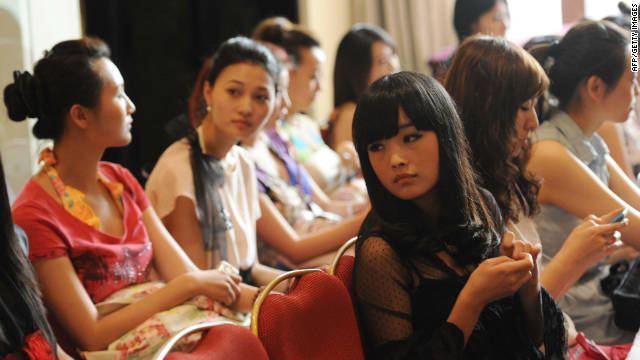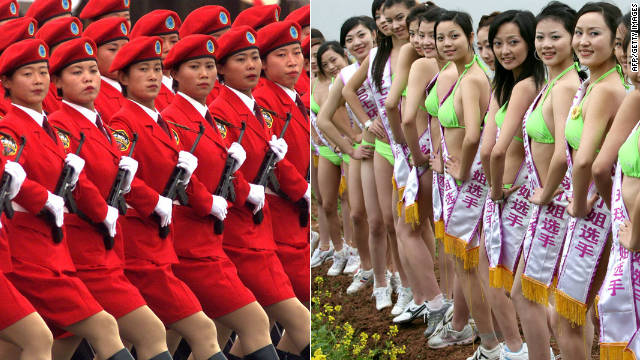


(CNN) -- In 1993, when the Miss World beauty pageant was commanding 1.8 billion viewers worldwide, the front page of the state-run Beijing Youth Daily published an article with a bright red headline reading, "Peking University women reject beauty pageants."
The article slammed beauty pageants as objectifying women and received widespread support from readers.
Nearly two decades later, concerns about the "unhealthy wind" of bikini-clad contestants, as traditionalists once bemoaned, has all but disappeared. China has a raft of pageants, talent contests and modeling competitions as societal and government attitudes change in the world's most populous nation.
Much as China seeks to build its naval might on the seas, Chinese society now has few qualms about women showing navels to gain glory among the footlights of international beauty pageants.
"China wants to win the most gold medals, the Nobel in everything and, well, why not a Miss World or Miss Universe competition as well," said Dr. Louise Edwards, director of the Modern China Studies program at the University of Hong Kong.
As pageants such as modeling contests and children's competitions proliferate, China has also spawned some less traditional types of pageants, including Miss Laowai China, a two-year-old competition to crown the most beautiful foreign woman in China; Miss Chinese Cosmos, where contestants are Chinese women living overseas; and Miss Pregnant, which needs little explanation.
Even Chinese women's groups -- once quick to decry events as objectifying women -- give somewhat grudging approval to the new wave of pageants. "All winners are models for women with inner and outer beauty," said a representative from the All-China Women's Federation, who asked not to be named.
But traditional concerns still remain. She added: "Some people consider it as a show that caters to men's aesthetic-functional needs."
Local governments, which see beauty pageants as a way to boost tourism and national prestige, have fed the boom.
China wants to win the most gold medals, the Nobel in everything and, well, why not a Miss World or Miss Universe competition as well
Dr. Louise Edwards, University of Hong Kong
Dr. Louise Edwards, University of Hong Kong
"In the national government's five-year plans, developing cultural industry became a strategic policy which forced local governments to focus more on 'soft power' industries, so they used pageants as a platform to promote the local city image," said Peter Wang, secretary-general of the Miss World China Pageant Committee.
Goodbye, Mao suit
Maoist notions of puritan equality have given way to eager contestants and booming television audiences. More parents of contestants -- many of whom lived through the tumultuous, bourgeois-hating Cultural Revolution -- are eagerly accompanying their daughters to pageants, Wang said.
The shift in Chinese attitudes toward pageants began in 1980s, which saw great enthusiasm for "allowing women to be women," said Edwards. "Some people regarded the Maoist years as years when 'women had to be men' so the liberalization period has seen a return to a carnivalesque hyper-feminity in things like beauty pageants."
In 1985, a government-run newspaper applauded the bikini as a "great challenge to the traditional concepts and remnants of feudal ideology," after they made their Chinese debut amid giggles and cat calls in a female body-building contest, Time Magazine reported.
Edwards has noted a growing acceptance of all things beauty since the 1980s. "The contemporary idea of womanhood seems to be linked to the 'right to be beautiful and to beautify' in China," she said.
Liu Chen, a 25-year-old musician from Harbin in China's northern Heilongjiang province who describes herself as "a girl full of talent and love for art," epitomizes this new attitude. As a contestant in this year's Miss World pageant in November, she said she is excited to represent China and make new friends from around the world.
"I am very lucky to represent China and show my country's history, love, charm and beauty," Liu told CNN. However, she admitted asking her parents' permission before entering the contest.
Growing audience and cash
The explosion of other pageant genres, which often include talent segments, suggests that viewers, not just the nature of pageants, are changing as well. Modeling competitions, such as Guangdong based Southern Television's New Silk Road modeling contest, are becoming increasingly popular.
"In the beginning, beauty pageants were just modeling competitions, looking for beautiful girls. Now we also look for talent; we are trying to change the pageants' positioning in China," Wang said.
China's pop idol talent competition "Super Girl" commanded over 400 million viewers at its peak, before being shut down by the State Administration of Radio, Film and Television (SARFT) because of its text message voting system, which officials saw as too closely resembling democracy. The Miss World China pageant's attracted four million viewers this year, Wang said.
Child beauty pageants are now on the rise in China, with New Silk Road holding modeling contests for not only young girls, but boys as well. The contest's website features photos of a young girl in a bikini and fairy wings and a boy wearing just shorts and makeup, smiling at the audience in a typical '90s boy band stance.
I am very lucky to represent China and show my country's history, love, charm and beauty
Liu Chen, Miss World China 2011
Liu Chen, Miss World China 2011
"We have two directions for this contest. One is to let children participate in this kind of contest to promote their hobbies. The other is to train them to have good temperament and manner for themselves to give others a nice impression," a modeling coach told CCTV at the event.
With audiences growing, many Chinese towns are seeking to repeat the tourist boom seen by Sanya, a resort city on China's Hainan Island, which has played host to all of the New Silk Road modeling contests in the last decade, as well as five of the Miss World pageants in the last 10 years.
In 2003, only two years after China began sending a representative to compete in Miss World, Sanya hosted its first Miss World pageant. Hainan's status as a special economic zone allowed it to be a testing ground in a country that was relatively new to pageantry.
The Crowne Plaza Sanya, where the Miss World pageants were held, raked in a whopping 100 million yuan ($15.6 million) during the first hosting in 2003, China Daily reported. The results left local governments around China wanting more.
Beyond commercial incentives, local governments also view beauty pageants as status boosters."Localities really think it reflects well on them if they have the 'most beautiful woman,'" said Edwards.
The central government is also utilizing pageant winners as cultural ambassadors to promote China's image overseas. After Zhang Zilin won the Miss World pageant in 2007, she was called upon to appear in a government publicity campaign, first appearing on the jumbo screens in New York's Time Square in January. The screening coincided with Hu Jintao's official visit to the United States. She was later chosen to run in the Universiade torch relay, a global competition for university students held earlier this year in Shenzhen. She will also be appearing in a campaign for L'Oreal Paris and has recently graced the covers of Chinese Elle and Harper's Bazaar magazines.
For Liu, who will vie for the Miss World title next month, her Chinese title has brought adulation, if seasoned with some online scorn.
"Most people said 'congratulations to you,' and more participants were very happy to see my success. But some people who didn't understand the situation had a little doubt," said Liu, referring to online criticism. She added, "You know if you are on the top there must be all kinds of voices. It's really very common, so I don't care."
No comments:
Post a Comment